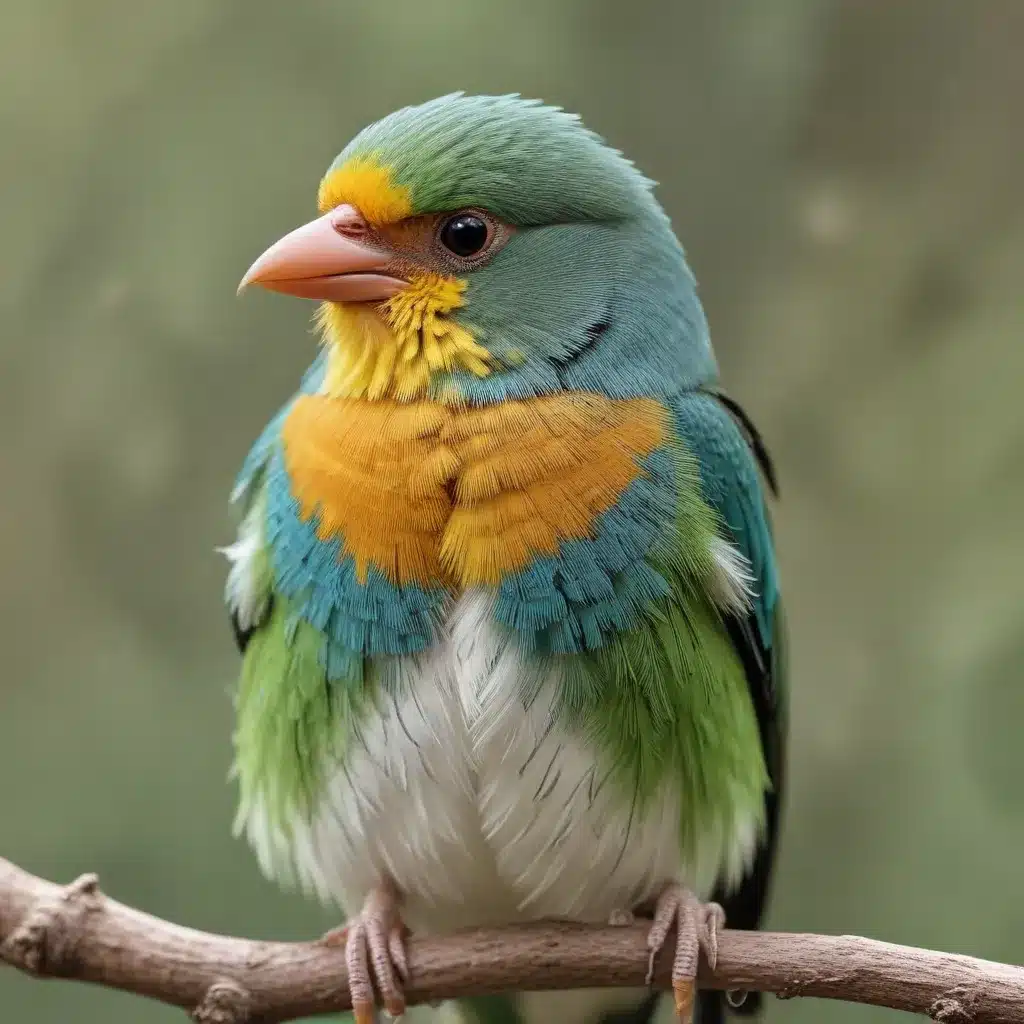
Avian Health and Wellness
As an experienced avian caretaker and expert in bird species, I understand the importance of taking a comprehensive approach to avian health and wellness. Birds, like all living creatures, can fall victim to a variety of illnesses and conditions that require diligent care and a holistic perspective.
Bird Anatomy and Physiology
To effectively treat bird illnesses, it’s crucial to have a deep understanding of avian anatomy and physiology. The respiratory system of birds is highly specialized, with a unique lung structure and air sacs that facilitate efficient oxygen exchange. Their digestive system is also quite different from mammals, with a crop, gizzard, and other adaptations for processing seeds, fruits, and other natural foods. Additionally, the avian immune system has some distinct features, including the presence of a thymus gland and a well-developed bursa of Fabricius, which play vital roles in immune function.
Common Bird Illnesses
Birds can suffer from a range of viral, bacterial, and parasitic infections. Viral diseases, such as Pacheco’s disease and psittacine beak and feather disease, can be particularly challenging to treat and may require specialized veterinary intervention. Bacterial infections, including salmonellosis and chlamydiosis, can also pose significant threats to bird health. Parasitic infestations, including mites, lice, and intestinal worms, can compromise a bird’s well-being and lead to secondary health issues if left unaddressed.
Holistic Veterinary Care for Birds
Providing comprehensive and effective treatment for avian illnesses requires a holistic approach that considers the bird’s overall well-being, environment, and underlying factors contributing to the condition.
Preventative Measures
One of the most important aspects of avian health care is preventative measures. Proper diet and nutrition are crucial, as birds require a carefully balanced diet rich in essential vitamins, minerals, and other nutrients to maintain optimal health. Stress management is also vital, as high levels of stress can weaken the immune system and make birds more susceptible to illness. Environmental enrichment, such as providing engaging toys, perches, and opportunities for natural behaviors, can also play a significant role in supporting a bird’s overall well-being and resilience.
Alternative Treatments
In addition to conventional veterinary care, there are several alternative treatment options that can be incorporated into a holistic approach to avian health. Herbal remedies, such as echinacea, goldenseal, and garlic, have been used to support the immune system and address various health concerns in birds. Acupuncture, a traditional Chinese medicine practice, has shown promising results in managing pain, reducing inflammation, and promoting healing in some avian patients. Homeopathy, a system of medicine based on the principle of “like cures like,” can also be explored as a complementary therapy for certain bird illnesses.
Integrative Approach to Avian Medicine
The most effective approach to treating bird illnesses often involves a combination of conventional and complementary therapies, tailored to the individual bird’s needs.
Conventional and Complementary Therapies
Pharmaceuticals, such as antibiotics, antiviral medications, and anti-inflammatory drugs, can be essential in addressing the acute symptoms of certain avian illnesses. However, these treatments should be carefully balanced with rehabilitation techniques, such as physical therapy and nutritional support, to aid in the bird’s overall recovery and prevent complications. Mind-body practices, such as stress-reduction techniques and environmental enrichment, can also play a vital role in supporting the bird’s well-being and promoting healing.
Individualized Treatment Plans
When it comes to treating bird illnesses, a one-size-fits-all approach simply doesn’t work. Each bird is unique, with its own set of symptoms, underlying causes, and individual response to various therapies. A holistic veterinarian will carefully assess the bird’s symptoms, consider the potential root causes, and develop an individualized treatment plan that incorporates a range of interventions, from conventional medications to alternative therapies, all tailored to the bird’s specific needs.
Promoting Avian Welfare
Caring for the health and well-being of our feathered friends is not just about treating illnesses; it’s also about fostering a deep respect for avian welfare and promoting a holistic approach to bird care.
Ethical Considerations
As responsible avian caretakers, we must always consider the ethical implications of our actions. This includes respecting the inherent rights and needs of captive birds, providing them with the highest standard of care, and advocating for the conservation of wild bird populations. By prioritizing avian welfare, we can ensure that our birds not only receive the best possible medical care but also thrive in an environment that supports their natural behaviors and overall well-being.
Holistic Lifestyle for Birds
Ultimately, a holistic approach to avian health and wellness goes beyond just treating illness; it’s about creating a lifestyle that supports the bird’s physical, mental, and emotional needs. This includes providing a naturalistic habitat, engaging in positive reinforcement training, and offering a variety of enrichment activities that encourage natural behaviors and foster a sense of well-being. By adopting a holistic mindset and empowering bird owners to become active partners in their birds’ care, we can help create a future where all birds, whether in captivity or in the wild, can thrive and flourish.
As an experienced avian caretaker, I’m passionate about sharing this holistic approach to treating bird illnesses. By combining conventional veterinary care with alternative therapies, preventative measures, and a deep understanding of avian physiology and behavior, we can help our feathered companions achieve optimal health and well-being. I encourage all bird owners to explore these holistic strategies and work closely with their veterinarians to create a personalized plan that addresses the unique needs of their birds. Together, we can promote a more compassionate and sustainable future for our avian companions.


